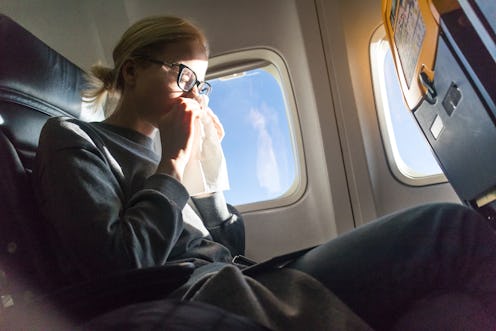Life
Do These 6 Things To Avoid Getting Sick On Planes

It's officially holiday travel season, which means that it's officially time to take better care of yourself so that you can show up at your parents' house for Christmas dinner without a pocketful of crumpled tissues in tow. A spike in the volume of travelers over the holidays equals a spike in reported illnesses that leave all us extra vulnerable, particularly if you're traveling on a plane. There are things you can do to avoid getting sick on a plane, thankfully, and they're not that difficult as long as you remember to actually do them.
Though we might not realize it, there are certain things that we do that make us more susceptible to picking up germs. Bustle talked to Dr. Jen Caudle, Family Physician, and Associate Professor at Rowan University School of Osteopathic Medicine about how to be not only aware of how to fight germs on the plane, but also how to alter our behavior reduce run ins with germs in the first place. And while these tips and suggests are supremely applicable during the winter holiday travel season, they're generally great guidelines to keep with you year-round. Aka, you'll want to incorporate these suggestions into your basic travel hygiene routine.
Wash You Hands Throughout The Day
According to Dr. Caudle, you should be washing your hands frequently, not just when you perceive them to be dirty. Wash them before you eat, after you eat, before you use the rest room, after you use the rest room, in the middle of the day after shaking hands or touching luggage or public doors, etc. Keep a good moisturizer in your bag and wash with antibacterial soap often.
Don't Touch Your Face, Like, At All
Dr. Caudle tells Bustle to avoid touching your face while you travel at all costs, "especially your eyes, nose and mouth to minimize the chances of getting infected with viruses and bacteria." If you're doing your make up on the go, use a tool so that you're not making any direct contact with your skin. If you use chapstick on the go, make sure you use a squeeze tube so that you're not dipping your finger into the pot and if you must touch your face, make sure to wash your hands first.
Carryon Hand Sanitizer
Don't go anywhere without hand sanitizer. You'll rely on this on the go when you can't make it to the bathroom sink. But even after you wash your hands on an airplane bathroom, you should follow up with hand sanitizer to kill what was left behind. You can also put hand sanitizer on a napkin and wipe down the tray table, arm rest, window and other controls or buttons that you have to use.
Don't Touch What You Don't Have To
If you can "minimize contact with airplane tray tables, bathroom doorknobs and other high-traffic areas," Dr. Caudle says you definitely should. If you can't avid this, use a napkin or cloth to do these things so that you're not making direct contact with these germ hotspots.
Bring Your Own
If you can, bring your own pillow and blanket so that you can have better control over what you come into contact with. If you can pack a healthy meal at home and have that as your inflight meal instead of what is served, that can help limit exposure too. Using your own flight entertainment also reduces your contact with germ-ridden surfaces that might not be cleaned between flights.
Focus On Your Immune System, Too
"Stay hydrated, get enough sleep and eat nutritious foods to keep your body healthy," Dr. Caudle tells Bustle. It's important that leading up to your holiday travel you get your immune system in great shape. The stronger your body is, the better it's going to be at fighting germs that it comes into contact with. Now is a good time start preparing to for battle with winter germs, so adjust your diet to include foods that support the immune system (garlic, citrus, leafy greens, mushrooms), put your phone down a little earlier each night and drink more water, yes, even more.
Sources:
Dr. Jen Caudle, Family Physician, and Associate Professor at Rowan University School of Osteopathic Medicine